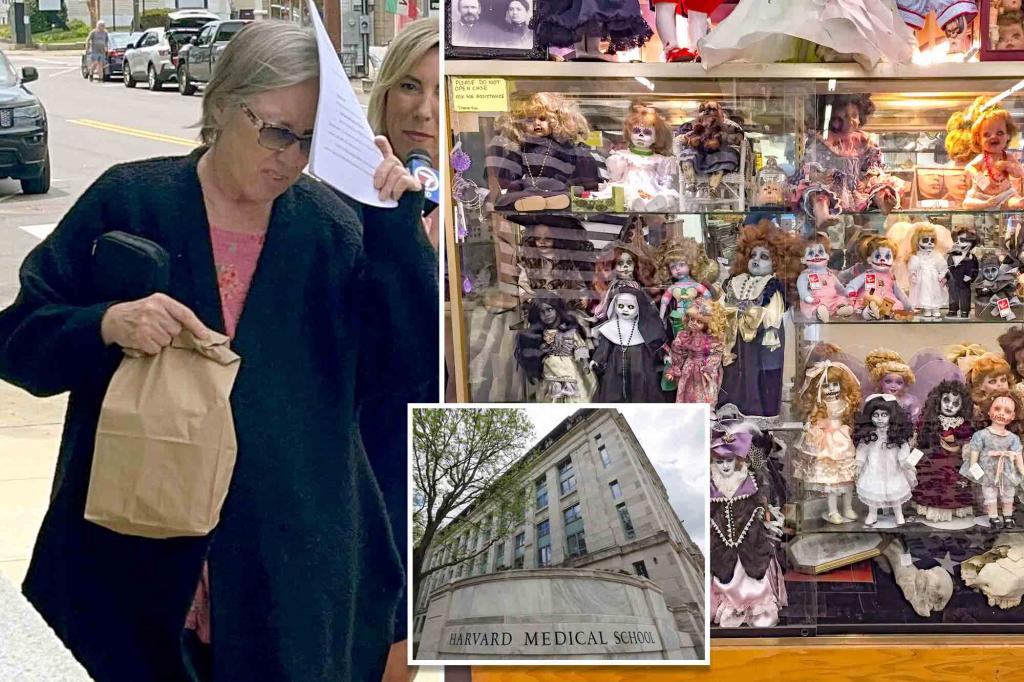Denise Lodge, the wife of a former Harvard Medical School morgue manager, pleaded guilty in federal court to charges of shipping stolen human body parts from the school’s mortuary to buyers across the country. Lodge, along with her husband and five others, negotiated online sales of human remains between 2018 and 2020. The scheme included the sale of two dozen hands, two feet, nine spines, portions of skulls, dissected faces, and heads. A mortuary employee from Arkansas was involved in selling body parts on Facebook, while a Massachusetts store owner bought a human skull to create a “killer clown” style doll.
Lodge’s attorney claimed that her husband was the mastermind behind the operation and that Lodge merely went along with it. She emphasized that no money had been lost and described the situation as more of a moral and ethical dilemma than a criminal case. Harvard Medical School donates bodies for education, teaching, and research purposes, with the remains being cremated and returned to the donor’s family after use. However, the morgue manager saw an opportunity within the black market and sold body parts without the families’ knowledge, resulting in his termination from Harvard.
The case revealed a thriving demand for human remains in the United States. While organ and tissue donations are heavily regulated by the federal government, oversight for whole bodies is lacking. Only four states closely monitor whole-body donations and sales, leaving room for unregulated body brokerages to profit from the deceased. Body brokers can sell a donated corpse for thousands of dollars, with body parts fetching varying prices based on their condition. Human heads, spines, hands, and entire bodies can be sold for thousands of dollars in a market primarily driven by medical schools, research facilities, collectors, and cosmetic surgery firms.
The scandal at Harvard Medical School underscored the need for stricter regulations surrounding the donation and sale of human remains. While the sale of body parts can be a lucrative business, it raises serious ethical and legal concerns. The involvement of multiple individuals in the scheme has highlighted the lack of oversight in the industry, leading to calls for increased monitoring and accountability. Families of the deceased are often unaware of what happens to their loved ones’ remains after donation, further emphasizing the need for transparency and ethical practices in the handling of human bodies.
The black market for human body parts continues to thrive due to the lack of comprehensive regulations governing the industry. With prices for body parts reaching thousands of dollars, there is a significant financial incentive for individuals to engage in illegal activities. The case of Lodge and her associates serves as a cautionary tale about the dangers of exploiting the deceased for financial gain. It also sheds light on the challenges faced by authorities in combating the illicit trade in human remains and the need for stronger enforcement measures to prevent such crimes from recurring in the future.
In conclusion, the guilty plea of Denise Lodge in the case of stolen human body parts from Harvard Medical School highlights the dark underbelly of the trade in human remains in the United States. The lack of stringent regulations and oversight has allowed for the exploitation of the deceased for profit, raising serious ethical and legal concerns. As the demand for human body parts continues to grow, it is essential for authorities to take action to prevent further criminal activities and ensure that proper standards are upheld in the handling of human remains. The case serves as a stark reminder of the need for transparency, accountability, and ethical practices in the industry to protect the dignity of the deceased and their families.













